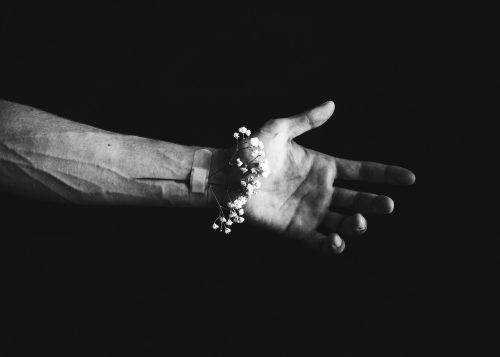I am seated on the warm side of floor-to-ceiling windows in a half-empty cafe, a black coffee on the table in front of me. A thick sheet of ice coats the sidewalk outside. Winter clouds hang over everything, the sky the color of a wet hippopotamus. “Graceless,” a song by The National, is playing softly through the overhead speakers.
Outside, a woman in a peacoat is traversing the icy walkway tentatively, planting each step with great care before planning the next, her arms outstretched and palms flat, as though she’s praying for less gravity. Her prayer goes unanswered, though, and with one misplaced step she slips backward. Her arms slice the air violently, hands grasping for something that isn’t there, until her backside finally connects with the concrete. Thwap!
I wince. Not because I feel her pain (literally), but because I feel her pain (figuratively). As the woman’s rear collided with the pavement, a twinge reverberated throughout my body. I, too, have fallen, so I know what it feels like. Or, rather, I know what it feels like to me. And this is a key difference.
Whenever we tell someone to “walk in our shoes,” we’re simply asking another person to put herself in our position for a moment, to be sympathetic of our circumstances. But when we do this—when we walk a mile in someone else’s shoes, as it were—we’re still approaching the situation from our own biased perspectives, which still may not allow us to empathize with the person who’s loaning her sneakers.
You see, sympathy and empathy are not the same thing. Sympathy understands someone’s pain; empathy feels it. Suffice it to say, we can never be truly empathetic—we can’t feel what another person feels completely—but that doesn’t mean we can’t try. When we care about another human, we must do our best to understand their pain.
Ergo, sympathy is our first step toward empathy. We must wear another person’s shoes before we can experience the blisters from their daily trek. By sliding into your sneakers, I can better understand what it feels like for me to walk in your shoes, even though I’ll never wholly understand what it’s like for you. I might not feel the weight of your journey, not totally at least, but I’ll certainly be closer after wearing your footwear.
Sympathetic of what the woman is feeling on the sidewalk outside, I dash out the door to assist. I don’t, however, notice the small patch of black ice just beyond the doorway, and Thwap!, I suffer a similar fate. With us both on our butts now, I may not be able to experience the woman’s pain, but I feel something close to it. After staring upward, as if the sky is to blame, we share a smile before the woman finds solid ground, and then helps me up as well.
“Walk a Mile in My Blisters” was originally a passage in Everything That Remains, but its chapter was one of many that didn’t make the final draft, so I decided to share it here instead.


